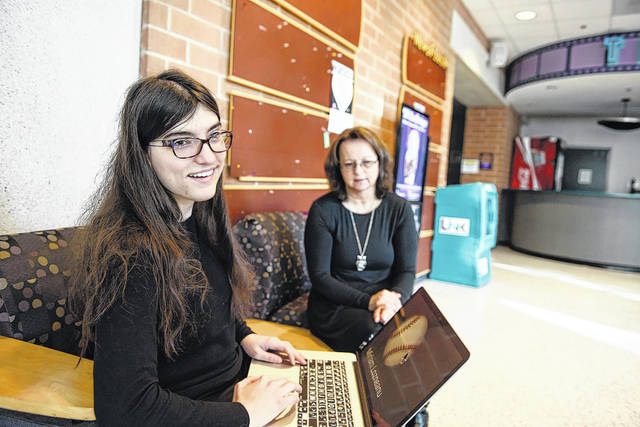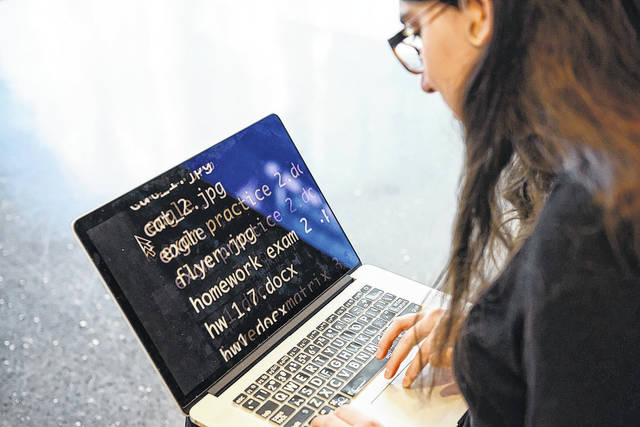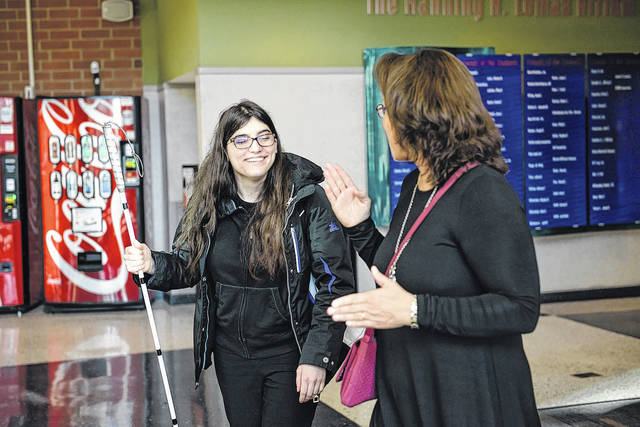CLEMSON — Miriam Lozneanu extended her cane, signed to her interpreter and headed out the door of the Hendrix Student Center. She went down the steps and crossed the street by herself without a stumble or hesitation.
Lozneanu, who is legally blind and partially deaf, is a 23-year-old computer science major at Clemson University.
With the help of technology, professionals and a positive attitude, Lozneanu is not only making it at Clemson but excelling. She worked an internship at Michelin North America, Inc. last summer and is literally shooting for the stars next summer by applying for an internship at NASA.
“I am thankful for being able to show my abilities and succeed despite not being able to see or hear much,” Miriam wrote in an email interview. “My goal is to use my exceptionality to encourage others to persevere despite hardship.”
Her abilities are many.
She is a talented artist with sketches that include an exterior of the Cooper Library and a bunny in Clemson overalls. She played violin in her middle school orchestra.
Miriam has racked up several academic awards, including membership in Delta Alpha Pi, an honor society for top-ranking students with disabilities. She made dean’s list in 2016 in the College of Engineering, Computing and Applied Sciences.
On the weekends, Miriam heads home to Mauldin to spend time with her family and her friends from church. She also does service work, telling her story to girls at a juvenile detention center.
Her goal at the center, she wrote, is to “to assist the girls in seeing that even though life is hard and there are obstacles in the way, God can provide a way.”
Ani Lozneanu said it took years of hard work to prepare her daughter to live independently.
“She’s a miracle worker– let’s put it that way,” Ani said. “She’s not taking no for an answer. She’s not discouraged. She’s always told me, ‘I can do it, I can do it.’”
One of the first classes Miriam took at Clemson was public speaking with senior lecturer Marianne Glaser. They met before classes started, and Miriam agreed to learn to how to speak to a hearing and seeing audience.
“She would even look from the left side to the right side,” Glaser said. “She would gesture. She would be grand when she wanted to be expressive. The audience would watch her. You might think the translator would become the attention. But she wasn’t. They would truly be listening to Miriam, even though it was someone else’s voice that was presenting it.”
She walked away from the class with a well-earned A, Glaser said.
The success has not come easy. Miriam explained that she has faced many challenges and obstacles.
“Interestingly, people assume that since I am deaf, the typical accommodations for deaf people should provide the right assistance for me,” she wrote. “And it is thought that since I am blind, the typical accommodations for the blind should work out just fine.
“Think with me about not being able to see or hear — often having both disabilities cancels out the way various provisions that help the deaf or the blind work.”
Technology has played a role in helping her adapt. She uses magnification software on her computer, iPad and iPhone to zoom in on the screen, allowing her to read and answer questions. With her residual vision, she can read print, although she describes it as a huge challenge.
Surgically-placed cochlear implants have enhanced her hearing and allow her to listen to music.
“I understand most speech when speaking one-on-one with a person, but I can’t understand group conversations or lectures,” she wrote.
Her parents live in in Mauldin and work at Michelin North America, Inc. Her father, Liviu, is an engineer, and Ani works on contract as a supervisor coordinator. Miriam has two brothers.
The United States is the only home Miriam has ever known, but she is originally from Romania. She was born prematurely and became sick, and complications from the treatment led to her vision and hearing loss, Ani said.
Miriam was still a small child when the family moved to the Detroit area in search of better medical care for her. She attended elementary school in the area, and Ani remembers becoming dissatisfied with the education Miriam was receiving.
After doing some research, the family relocated again to Kennesaw, Georgia, where Miriam began 6th grade at Pine Mountain Middle School.
Ani said she was afraid when Miriam told her she wanted to play violin in the orchestra, wondering if she would be able to do it and how it would affect her if she failed.
The family decided to give it a try and bought a violin. Ani remembers being shocked at how well her daughter played.
“In the concert, I was like, ‘Wow! She can do it! She really can do it!’” Ani recalls. “Everybody was amazed. It was an example for everybody.”
Miriam also had her setbacks. She was disappointed when she didn’t make it into an advanced math class, so she worked harder, Ani said.
Miriam started going to school an hour early twice a week for help. She received her class’ highest math award for the 2009-10 school year, Ani said.
“She was so good in math,” Ani said, her voice cracking with pride eight years later. “She was doing every math problem she could solve. She was so determined. I never saw anybody in my career so determined. This child truly, truly deserved this.”
Miriam wrote that while she won several awards at Pine Mountain Middle, her achievements in 6th-grade orchestra and 8th-grade math stand out and that she had help from excellent, caring teachers.
“I was proud of these achievements because they seemed impossible, and I worked hard to overcome the obstacles,” Miriam wrote.
The family moved to Mauldin when Miriam was in 11th grade to be closer to Ani’s sister, who is an engineer at General Electric.
Miriam attended J.L. Mann High School and remembers studying four to six hours a night. Magnifying assignments makes them take “much, much” longer, she wrote.
Miriam went to the Helen Keller National Center on Long Island in New York in 2013 to learn the skills she would need to live independently, such as safe mobility.
While in the state, she visited the Rochester Institute of Technology, which has a large number of deaf students.
But Miriam decided she wanted to stay close to home and told her mother, “I have it in my heart to go to Clemson.”
Ani said she initially wondered how her daughter would navigate campus without getting lost but that Miriam put her concerns to rest soon after moving to the University.
“I was lost and said, ‘Miriam, let’s ask somebody because I don’t know how to go back,’” Ani recalled. “She said, ‘No, don’t worry. I can guide.’”
Miriam wrote that in her internship at Michelin, she had three different projects centering on inclusion and information technology. She worked 40-hour weeks and taught some of her co-workers sign language.
“We were fortunate to have Miriam work with us,” said Herb Johnson, head of Diversity and Inclusion for Michelin North America, Inc. “She helped us learn and grow as an organization around a different diversity dimension.
“Michelin believes in all forms of diversity. It helps us better meet the needs of our customers through unique lenses. We appreciated Miriam’s passion, drive and willingness to help us become a more inclusive organization in understanding her lenses.
“Miriam had a positive impact on everyone she came in contact with and inspired us to learn ASL sign language. We also provided her with three business projects to help her grow in her field and exposed her to some outside of her field to help prepare her for life after graduation.”
A transition period from college to work is critical for disabled college students, Miriam wrote.
“I enjoyed my time with the employees as well,” she wrote. “I am very grateful that Michelin gave me an opportunity to experience the working world and to learn so much.”
Ani said that transportation to work was sometimes an issue. While she, her husband and daughter all worked at Michelin, they were in different locations. One of Miriam’s co-workers organized a carpool.
Ani said no one would accept gas money.
“Miriam got a lot of support from people,” Ani said. “I think it was absolutely amazing. All thumbs up to Michelin for the way she was treated and made to feel welcome and home.”
Miriam wrote that the work she would do at the NASA internship would depend on which program accepts her. She is applying for positions involving software support for computers, networks and instrumentation and an app for solar particle events.
What interests her most is that she would be able to apply her computer training to the real world, she wrote.
“My goal is to learn as much as I can and use the experience and knowledge to enhance the lives of disabled people through technology,” Miriam wrote.
On the weekends, Miriam attends Palmetto Baptist Deaf Church and goes to social events with other church members. She wrote that she enjoys the sermons of Pastor Rusty Vandonkelaar, who she counts as one of the most influential people in her life.
Vandonkelaar wrote in an email interview that Miriam is motivated to learn what he preaches and does so through her iPad and iPhone.
“She is a very hard-working woman and doesn’t give up,” he wrote.
Miriam, who is minoring in Digital Production Arts, expects to graduate Clemson in December 2018. She plans to look for a job developing websites or applications. Miriam wants to use her skills to help others experiencing technical issues and is interested in assistive technology and programming.
“I am very blessed to live at a time when so many options are available for people with disabilities,” she wrote. “The most frustrating situation is when people like me with disabilities are unable to succeed because they cannot see or hear or walk.
“With the amazing advanced technology available, it is possible for each to receive adequate accommodations to be able to succeed. I try to persevere with a positive attitude knowing obstacles can be overcome, allowing me to show my abilities.”




